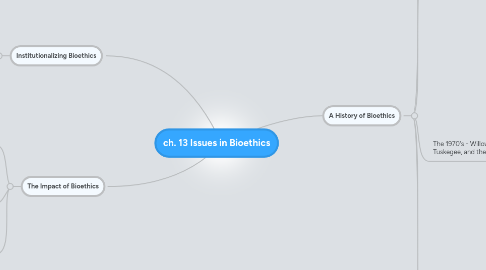
1. Institutionalizing Bioethics
1.1. Hospital Ethics Committees
1.1.1. Arose in the 1980's
1.2. Institutional Review Boards
1.2.1. IRBS: charged with reviewing all federally funded research projects involving human subjects
1.2.2. Pharmaceutical research has shifted from federally funded projects to for-profit projects.
1.3. Professional Ethics Committess
1.3.1. For example, The American Fertility Society
1.4. Community Advisory Boards
1.4.1. Linked to a rise in genetic research
1.4.2. Genetic tests can stigmatize an entire community.
2. The Impact of Bioethics
2.1. The Impact on Research
2.1.1. Lack of resources and conflicts of interest limit the effectiveness of IRBs
2.1.2. Curbed the most egregious abuses of human subjects
2.2. The Impact on medical Education
2.2.1. incorporation of ethics training into medical education
2.2.2. Courses are common at med. schools
2.3. Impact on Clinical Practice
2.3.1. Some laws affect how doctors document their actions but do not affect their actions.
2.3.2. Doctors continue to assert their discretion
3. A History of Bioethics
3.1. The Nazi Doctors and the Nuremberg Code
3.1.1. At this time, Germany's medical schools were respected worldwide.
3.1.2. The Nazi government passed the Law for the Prevention of Congenitally Ill Progeny. This law required the sterilization of anyone considered likely to give birth to children with diseases that doctors considered genetic.
3.1.3. Eugenics: The theory that the population should be "improved" through selective breeding and birth control.
3.1.4. In 1939, the Nazis began systematically killing patients in mental hospitals.
3.1.5. Doctors played a major role by selecting patients for death and systematically killing them or watching them die.
3.1.6. Nuremberg Gode: A set of internationally recognized principles regarding the ethics of human experimentation.
3.1.6.1. Requires informed consent.
3.2. The 1960's - The Rise of Bioethics
3.2.1. There was a rise in new technologies in the U.S.
3.2.2. Medical practice was addressed with the development of dialysis.
3.2.3. However, reasearch using questionable methods was still occuring.
3.2.4. Beecher conducted a study looking into the lack of informed consent occuring, results showed that most subjects were not alerted of the risks involved in studies.
3.3. The 1970's - Willowbrook, Tuskegee, and the Right to Die
3.3.1. The Willowbrook Hepatitis Study
3.3.1.1. An instutition for mentally retarded children - conditions included children often left naked hungry or lying in urine/excrement
3.3.1.2. Researchers injected children with hepatitis while only giving parents vague descriptions of the research.
3.3.1.3. The ethical flaws were exposed.
3.3.2. The Tuskegee Syphilis Study
3.3.2.1. This study was intended to document the natural progression of untreated syphilis in African American men.
3.3.2.2. Used participants who were desperately poor and mostly illiterate.
3.3.2.3. The men were not told they had syphillis and not treated for the ailment.
3.3.3. The Right to Die
3.3.3.1. Karen Quinlan ingested drugs and at the age of 21 would never gain mental or physical functioning.
3.3.3.2. Her parents requested that she be removed from life support and the doctors refused.
3.3.3.3. This spurred many right to die debates.
3.4. The 1980's and 1990's: Reproductive Technology, Enhancements, and Priorities
3.4.1. Reproductive Technology
3.4.1.1. Medical developments that allow doctors to control the process of human conception and fetal development.
3.4.1.2. These cases raise questions regarding the morality of intervening so directly in the process of human reproduction, including whether individuals are harmed or helped by having access to such technologies.
3.4.2. Enhancing Human Traits
3.4.2.1. Ethical questions are raised such as genetic preselection or fetal surgery.
3.4.2.2. Questions about what insurance should cover for drugs such as viagra have risen.
3.4.3. Setting Priorities
3.4.3.1. Medicaid
3.4.3.2. MCOs
3.4.3.3. Rationing of health care has become a problem.
3.5. The New Millenium: Stem Cell Research
3.5.1. brings up issues of cloning
3.5.2. Stem cells can be harvested through growth in a lab or from fetal blood left in the system after giving birth - this raises few ethical questions
3.5.3. The ethical question surrounds using fetal stem cells from human embryos.
